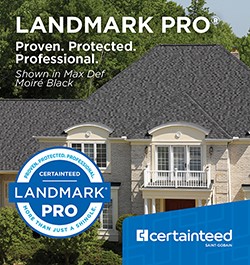EPA lead paint abatement
« Back To Roofers TalkAnybody have any experience with the new rule and how it may impact roofers? examples cutting back siding or replacing fascia?
If the home or child occupied facility was built before 1978 you should assume there is lead paint. You are supposed to put poly down on the ground 10' away from the home for 1 story homes adding another 4' for every story space permitting. If its an insurance job you can estimate for this. When you're done you have to fold up the poly in a particular way, have the guys wear respriators, etc. Lead is actually serious especially for kids under 6, causes high blood pressure, etc...
Many municipalities won't give you a building permit without the certification.
If you are disturbing more than (6 sq. ft interior)20 sq. ft per 30 days of exterior paint on a home before 1978, this is basically required by the EPA. You should become a certified renovator. It costs about 250 bucks, but enables you to fall under the EPA rules and have your crews just follow certain precautions. Don't test for Lead - it's not required if you take the right precautions. If you test for lead, you are opening up a can of worms for that homeowner. You are supposed to post signs, be there in the morning directing the crew, and be there for the cleanup.
It'll make O&P easier to get on insurance jobs and you can go nuts on the poly and precaution charges.
Lead boots don't matter under the rule, it's for renovations and painting. Interiors are another ball of wax.
I have a few friends who are certified. The post about tarping is correct for removal. After the lead is collected into the tarps they must but collect in the middle and taped close.
The first report I heard was a $30some THOUSAND dollar fine but now have heard a $10K fine. One of my friends while at the class asked who would enforce this new law. A contractor said, the dept of labor/industry. The instructor laughed. He then proceeded to call a friend of his at the top level in the state to ask if the dept of l/i was going to inforce it and his answer was no, they haven't asked us yet. As of right now in the state of Minnesota there is no enforcing body to regulate this late. The other day a home owner was told at a home show that the deadline was bumped from April to July. There is also an opt out form the home owner call fill out as long as no kids reside in the home.
If you remove old drip edge that has been painted with lead paint you fall into the catagory.
1. You need to have a test done to see if it's got lead. What raises my eyebrow is why only one company makes it? 2. If lead is found you have to have somebody who's been certified on site the entire time the lead is removed. 3. Proper prep work, removal, and disposal.
$35 a job more? The same people who said cap and trade will only cost us an additional $170 a year must have come up with those numbers!!!
BTW, it's not ebatement, that's a whole different can of worms, it's removal and disposal (the exact words of my inspector at my lic renewal this Spring)
I have a few friends who are certified. The post about tarping is correct for removal. After the lead is collected into the tarps they must but collect in the middle and taped close.
The first report I heard was a $30some THOUSAND dollar fine but now have heard a $10K fine. One of my friends while at the class asked who would enforce this new law. A contractor said, the dept of labor/industry. The instructor laughed. He then proceeded to call a friend of his at the top level in the state to ask if the dept of l/i was going to inforce it and his answer was no, they haven't asked us yet. As of right now in the state of Minnesota there is no enforcing body to regulate this late. The other day a home owner was told at a home show that the deadline was bumped from April to July. There is also an opt out form the home owner call fill out as long as no kids reside in the home.
If you remove old drip edge that has been painted with lead paint you fall into the catagory.
1. You need to have a test done to see if it's got lead. What raises my eyebrow is why only one company makes it? 2. If lead is found you have to have somebody who's been certified on site the entire time the lead is removed. 3. Proper prep work, removal, and disposal.
$35 a job more? The same people who said cap and trade will only cost us an additional $170 a year must have come up with those numbers!!!
BTW, it's not ebatement, that's a whole different can of worms, it's removal and disposal (the exact words of my inspector at my lic renewal this Spring)
Stephen Said: Real life example of how these regs are already torpedoing otherwise perfectly viable restoration projects----------I worked out a proposal this past weekend for a slate and spouting restoration project. 1910s era house- lovely american 4square-lovingly maintained for 100 years.
Project would have involved replacing about 400 slates- mostly do to disaterous installation of k style spouting hangers, new waste stacks, 2 chimneys flashed in copper, 4 valleys, 150 ft. of new gutter etc.
the fly in the ointment will be replacing 2 courses of lap siding which had been drilled and filled for insulation purposes-maybe 300 lineal feet,total.- replacing these courses of siding would be critical to the over-all quality and aesthetics of the project-but will now almost certainley torpedo the entire project.
stephen
Why? Was the extra $35 too much for the customers to absorb?
Real life example of how these regs are already torpedoing otherwise perfectly viable restoration projects----------
I worked out a proposal this past weekend for a slate and spouting restoration project. 1910's era house- lovely american 4square-lovingly maintained for 100 years.
Project would have involved replacing about 400 slates- mostly do to disaterous installation of k style spouting hangers, new waste stacks, 2 chimneys flashed in copper, 4 valleys, 150 ft. of new gutter etc.
the fly in the ointment will be replacing 2 courses of lap siding which had been drilled and filled for insulation purposes-maybe 300 lineal feet,total.- replacing these courses of siding would be critical to the over-all quality and aesthetics of the project-but will now almost certainley torpedo the entire project.
stephen
Old School Said: I saw a house being scraped yesterday. They had plastic every where. Taped to the house, on the ground, up a small fence around the outside of the house apron. There were no bushes around the house, but it there had been, they had all be removed. I would imagine that a stiff breeze would make it impossible to set one up, and I believe that a strong wind would blow everything they had set up away. I would say that they had about 8 - 10 hours in set up alone. WTF
Not to worry. On the EPA site, it says this will add about $35.00 to the cost of each job. :woohoo:
lol
And they want to take control of our health care?
roofer54 Said: I do mostly new construction, still using lead boots for flashing, are they inforcing this yet?
Do you have a trick for keeping the leads boots pristine? Sometimes, I can't even find one at the supply house that isn't wrinkled.
I do mostly new construction, still using lead boots for flashing, are they inforcing this yet?
grislydabeah Said: Anybody have any experience with the new rule and how it may impact roofers? examples cutting back siding or replacing fascia?
I'll tell you how it's impacted me. I'm now using the EPA regulations to steer homeowners away from using lead pipe flashings. There are several reasons why I don't like the lead boots. 1) they cost more....which really isn't a big deal. 2)they are harder to get sized right...which again isn't a big deal. 3)My biggest reason is complaints. The only complaints I had last year were "wrinkly looking" lead pipe flashings. The customers questioned whether I had changed them and told me that they look "old".
I hate unhappy customers and they are much happier with nice shiny painted pipes and the cheaper 3 in 1's. I had one customer who insisted that I remove 7 lead pipe flashings and put the "no calks" on. Ever since then, I've avoided the lead pipes as much as I can. Now, I get to scare my customers by telling them that the Feds might enact regulations that could lead to substantially higher priced roof repairs in the future because of the danger of the lead. I'm not bsing anyone either. I can envision the feds broadening their rules and forcing roofers to pay silly stupid amounts to dispose of lead flashings.
check the topics below. we talked about this









-2.png)












